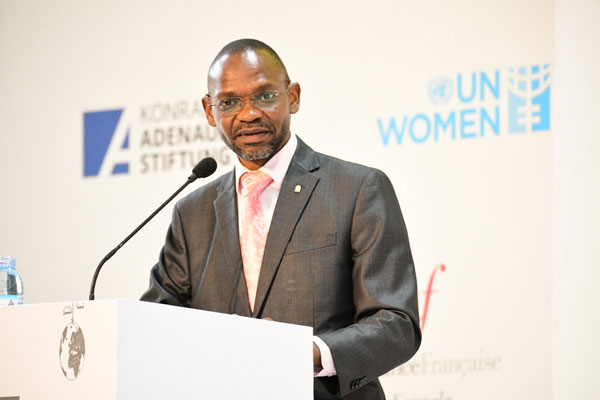
Kampala, Uganda | THE INDEPENDENT | Makerere University Deputy Vice Chancellor in Charge of Academics, Professor Umar Kakumba, has warned young people, particularly students, to exercise caution in their use of Artificial Intelligence (AI) to prevent the potential erosion of creativity. He made the plea while addressing a gathering at Yusuf Lule Teaching facility during the first day of the 6th edition of the Kampala Geopolitics Conference.
Makerere University is hosting the two-day event, which brings together scholars, international researchers, and experts, as well as a diverse audience, including students, academia, civil society representatives, media, political decision-makers, and members of the diplomatic community. The conference aims to discuss current geopolitical questions and trends.
The conference’s discussions will encompass various challenges, such as representation in the tech sector, gender disparities in tech education, and the need to improve safety and access to technology, all of which are critical for economic growth and job creation.
During his address, Kakumba referenced research that suggests the rapidly expanding network of Artificial Intelligence (AI) has the potential to enhance human effectiveness. However, he also issued a warning that it simultaneously poses a threat to human capabilities by fostering an overreliance on AI for most tasks, which could ultimately stifle individual creativity.
Speaking to URN (Uganda Radio Network) on the sidelines, Kakumba reiterated that, while AI offers numerous advantages, it poses a substantial threat to creativity, especially among Uganda’s youthful demographic, which comprises a significant portion of the nation’s population. He highlighted the growing trend of students relying on AI, including tools like ‘ChatGpt,’ for research and coursework, often bypassing traditional library-based research methods.
Dr. Paulina Chiwangu, the UN Women’s Country representative, emphasized that while digital innovations offer numerous opportunities, Uganda faces a significant challenge, with only a small fraction (23%) of its population able to access these opportunities due to the existing digital divide. She stressed the need for urgent measures to address this issue and narrow the digital gap.
Chiwangu stated, “Globally, digital innovations are creating unprecedented opportunities for access to information and economic growth. In 2020, mobile broadband networks reached 75% of the population, but only 23% had access to mobile internet. This digital inequality disproportionately affects the poor, women, rural populations, the elderly, and persons with disabilities.” She further advocated for investments in digital education and infrastructure, digital literacy promotion, and widespread digital success.
Chiwangu also noted that Uganda faces both challenges and opportunities due to its young population. She emphasized the responsibility of leaders to create responsive policies that can harness the potential of the youth population. Eric Touzé, Director of Alliance Française Kampala, called for periodic discussions about global peace, highlighting that non-peaceful environments, such as wars, have far-reaching effects on other countries.
He mentioned ongoing conflicts, such as those between Russia and Ukraine and Israel and Palestine, and how they impact Africa both economically and diplomatically. Touzé advised East African states to make informed decisions in their discussions regarding Somalia, drawing a parallel to Europe and America’s discussions about Afghanistan, which, in his view, led to unfavorable outcomes.
*****
URN
 The Independent Uganda: You get the Truth we Pay the Price
The Independent Uganda: You get the Truth we Pay the Price




Professor Umar Kakumba’s caution about the use of Artificial Intelligence (AI) at Makerere University’s Geopolitics Conference is pertinent. While AI can enhance human effectiveness, overreliance on it, particularly among the youth, may stifle creativity. Balancing AI’s advantages with fostering individual ingenuity is crucial. Additionally, addressing the digital divide and promoting digital literacy are essential for inclusive access to technological opportunities, as emphasized by Dr. Paulina Chiwangu. Finally, Eric Touzé’s call for informed decisions in geopolitical discussions reflects the interconnected nature of global peace and its implications. This are my views not for VINAStech